Czech Republic Goes Full Trump With COVID, Gets Crushed by Second Wave
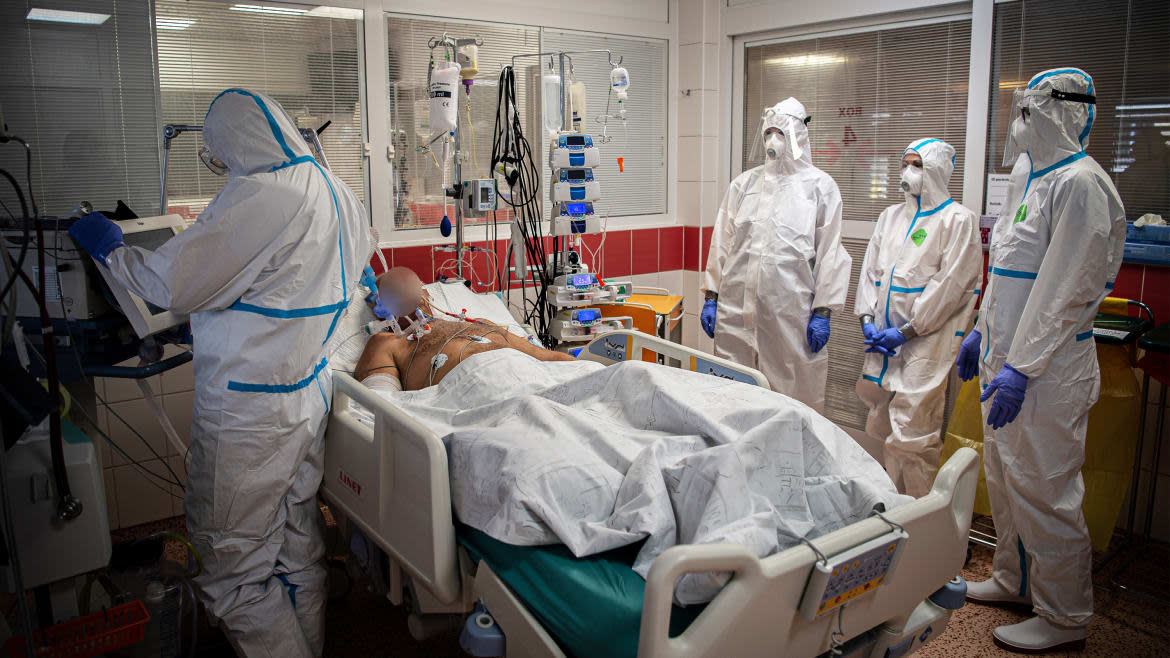
PRAGUE—As COVID-19 ravaged Europe this past spring, the Czech Republic was, without a doubt, the poster child for how to successfully beat the virus. With its strict national mask mandate and early shutdown, it recorded a mere 300 deaths in the first wave even as its neighbors recorded tens of thousands of virus fatalities.
Months later, it is now a case study in how to be recklessly cavalier toward the deadly disease.
By the beginning of October, the virus struck back in full force and Czech authorities recorded the highest number of deaths per 100,000 in the entire world. In one week, this country of 10.6 million lost almost 700 people to COVID-19. Hospitalizations shot up from a few hundred in September to a staggering 7,200 in the second half of this month.
‘Urban Warfare’ as Europe’s Second Wave Spins Out of Control
The Czech government is now scrambling. After officials ordered the re-closure of restaurants and schools on Oct. 14, they also decided to set up two field hospitals—in Prague and in Brno, the second largest town in the country—designed exclusively for potential COVID-19 patients with a capacity of 800 beds. Still, fearing it might not be enough, Prime Minister Andrej Babiš declared a nightly curfew that went into effect on Wednesday, and is mulling a second lockdown.
The new wave of restrictions was met with concern, displeasure and anger. There have even been demonstrations in downtown Prague; in one case, the police had to disperse the crowd of a few hundred with tear gas. Police choppers hung high above in the sky monitoring the strife. Some in the crowd held signs like “Stop COVID Hoax” or “Masks=Muzzle.”
Otherwise the streets of the capital are largely deserted and quiet, including Wenceslas Square where the famous Velvet Revolution protests took place in 1989 which led to the fall of the Communist regime. On the first day before the curfew, the square was eerily empty.
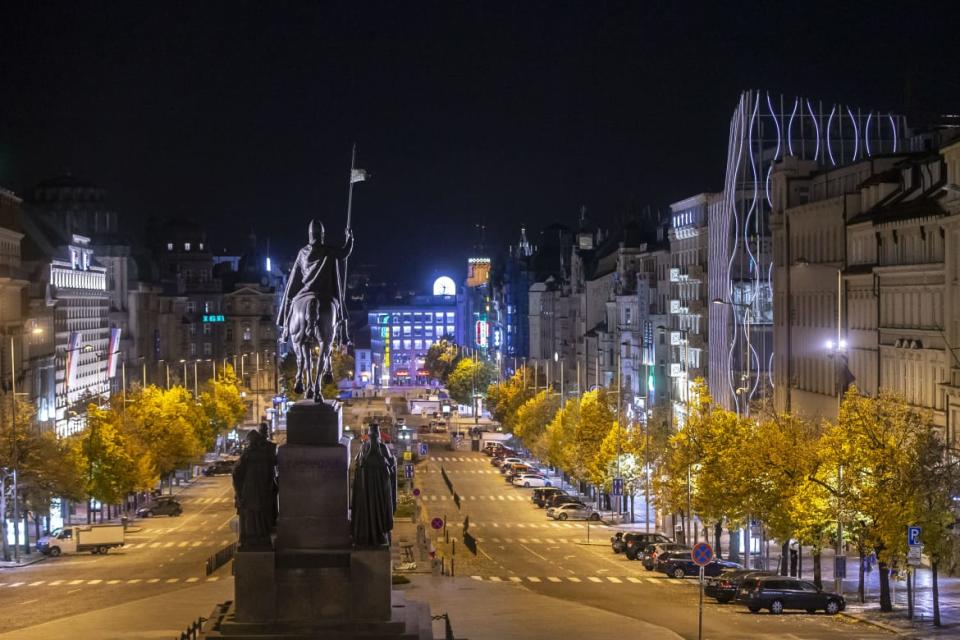
An empty Wenceslas square is seen during the nationwide COVID-19 curfew on October 28, 2020 in Prague, Czech Republic.
The country didn’t have to find itself in this alarming situation, epidemiologists say. Some warned the government for weeks and months on end. Instead, the officials declared early in the summer a premature victory and people dropped all precautions, feeling relieved and joyous.
Evolutionary biologist Jaroslav Flegr didn't share the collective giddiness after the country managed to get the disease under control during the first wave in the spring. He knew that the virus was still lurking in society and would return with lethal force come autumn. Walking the streets of Prague during the summer, the biologist was in shock at what he was seeing. No one was wearing a mask, people swarmed popular beer gardens and disregarded social distancing, and many businesses didn’t have hand sanitizers available anymore. There was even a massive feast on the famous Charles Bridge at the end of June where 2,000 people sat at long tables, munching on roasted geese, sandwiches and cakes. The guests made champagne toasts celebrating “the end of the virus.”
Flegr, who teaches epidemiology at Charles University (one of the oldest universities in the world), was certain that the seemingly virus-free Czech Republic would turn into a COVID-19 nightmare. So started to sound alarm bells in the form of blistering critiques delivered on his blog and Facebook page, and during television interviews and debates.
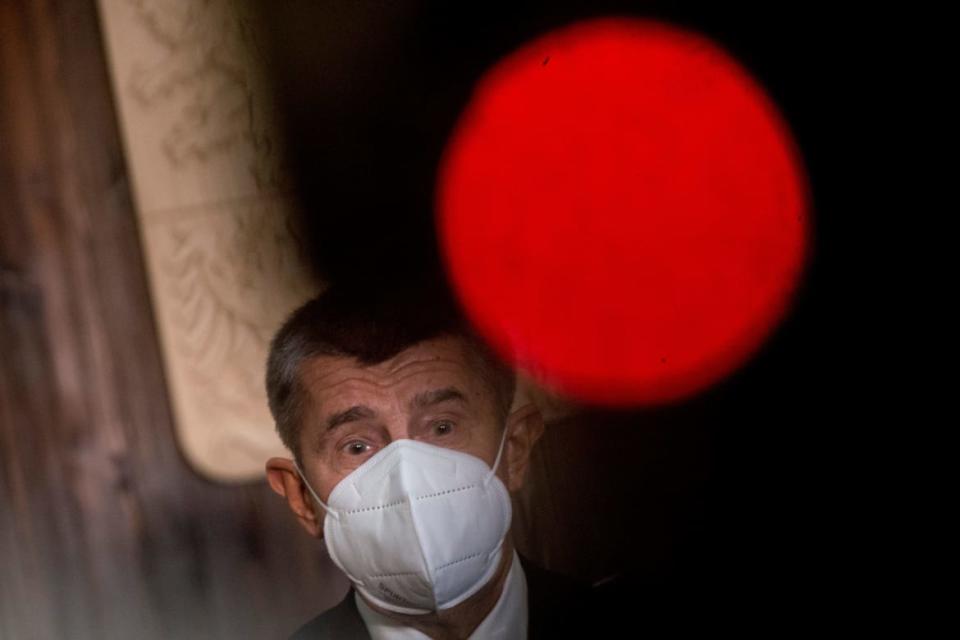
Czech Prime Minister Andrej Babis wears a face mask as the Czech Republic's new Health Minister is inaugurated to his new office on October 29, 2020 in Prague.
But not many in the government heeded Flegr’s warnings. He was widely dismissed and ignored. There was no appetite for going back to the spring’s severe restrictions, which had caused substantial damage to the Czech economy, disrupted countless careers and halted a favorite pastime of many Czechs—beer drinking in the company of friends. One time, a member of the country’s COVID Task Force walked out on Flegr during a televised debate, citing what he claimed were Flegr’s tendencies to spook the population for no reason.
Flegr’s arguments about a COVID-19 resurgence were unpopular. They also turned out to be right. His predictions about skyrocketing infection rates, followed by rising hospitalizations and deaths, have proven accurate.
“The government says we will make it—but the harsh truth is that, in the short run, we won’t,” Flegr told me. “And it didn’t have to be this way. So many people will die needlessly.”
One of the few government officials to heed Flegr, the Secretary of Health and Human Services, Adam Vojtěch, was worried over the summer too. Vojtěch suggested in mid-August that Czechs should put their masks back on while in indoor spaces like stores, schools, restaurants and barbershops. But he was sharply rebuked by the Prime Minister Babiš. A month later Vojtěch was removed from office.
The Czech Republic was so successful at containing the first wave that it’s led some to doubt the threat was ever real. Between March and May, the country recorded on average “only” 100 cases per day and the death toll reached just 300, a little above the level of seasonal flu casualties. (One mind-blowing number here: the country’s positive rate among those tested fell to 0.5 percent in May. Now, we are at 32 percent—actually, yesterday it was 34 percent.)
The Czech Republic was also one of the first countries to close its borders and shut the economy down back in March. The government mandated a two-and-half-month-long national mask-wearing rule. People complied and the country halted the spread of the virus, earning acclaim all across the European Union.
“The Czech Republic has become the victim of its own success but there was also a sudden lack of government coordination effort. It all fizzled out,” states Ruth Tachezy, a molecular and tumor virologist at the prestigious research institute BIOCEV, located in the outskirts of Prague.
Tachezy fears that people might not be willing to restrict their lives again given the fact that the country sailed through the first wave unscathed. She believes that many people now take disease as something benign and practically nonexistent.
“It is horrific to me that we had to find ourselves in the current situation so people would start behaving responsibly again. I hope they will, especially now when they see the rise in the death cases,” she told me.
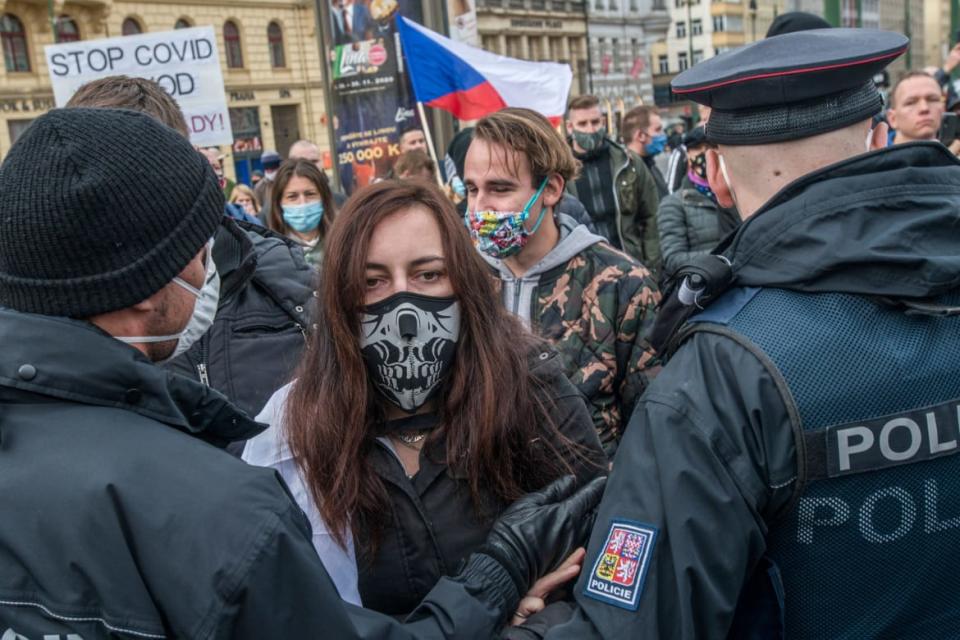
Protestors face police as they attend a demonstration against the Czech government's anti-virus restrictions on October 28, 2020 in Prague, amid the second COVID-19 wave in Europe.
Inside the special COVID Unit in a hospital in the northern town of Litoměřice, the team of 12 doctors and nurses is visibly overstretched. Back in March they had just a dozen patients to take care of; now the unit is overflowing with sick people in desperate need for oxygen.
Conditions have gotten so bad in recent days that two additional units had to be open to meet high demand. Currently there are 100 COVID-19 patients altogether in this unit, a steep increase from a few dozen the hospital treated over three months in the spring.
“Back then it was just a rehearsal for us. Now, it is a hundred times worse. In the spring most of the people could breathe on their own and spent a few days here. This time around they need oxygen and stay for weeks,” says Iva Burešová, a nurse.
One more thing has changed: there is no public display of solidarity with the first responders and health-care workers anymore like in the spring. No applause is resonating from balconies during these dark, anxious days.
“It feels like people have forgotten about us and those who claim that the virus is a hoax should come to our hospital to see it with their own eyes. Unfortunately, many don’t believe that the virus is real. But people do die all around us these days,” says nurse Burešová who has been transferred from the gynecology department to ease the workload at the COVID Unit.
She is exhausted and also worried about what the next day might bring. The Czech Republic has a high rate of infected doctors, nurses and hospital attendants. According to the government figures, every 13th health-care worker has caught the virus.
“I am not that old but I do fear that my parents and my boyfriend can catch it from me in case I get it,” says this 24-year-old nurse who has been assigned to the first floor filled with the most severe cases.
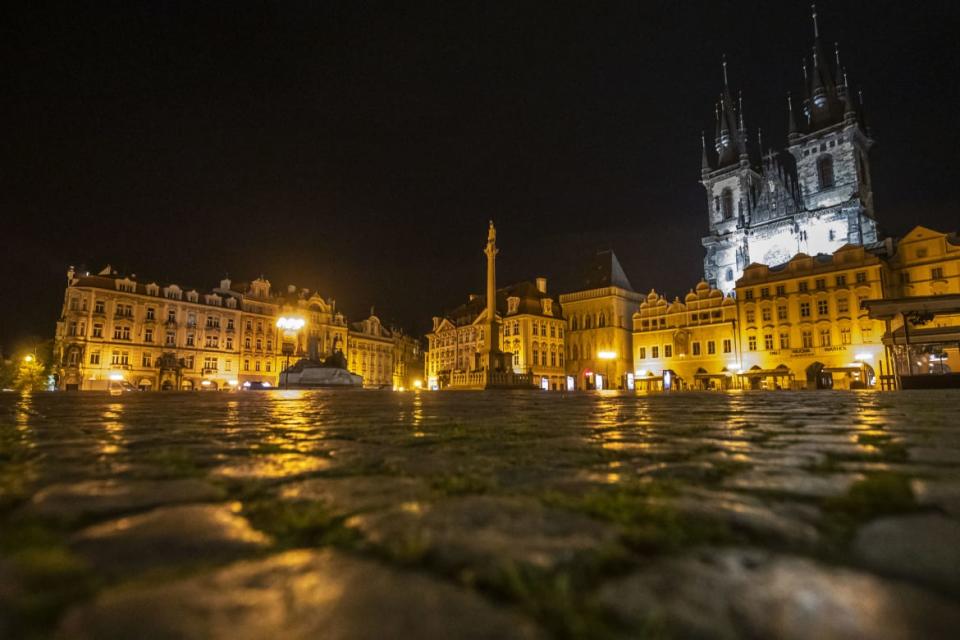
An empty Old Town Square is seen during the nationwide COVID-19 curfew on October 28, 2020 in Prague, Czech Republic.
Here all 20 patients are hooked up to oxygen, and some needed to be intubated. The unit is filled with a cacophony of sounds. Machine beeping, oxygen hissing, pressure gauges wheezing and then there is an occasional sharp sound of a cardiac monitor alerting the professionals dressed in protective gear that a patient is in crisis. In the last two weeks, seven people have died in this unit alone.
“It is often so sudden. In one moment, you talk to a patient, draw his blood and in another you have to try to resuscitate him and see him dying,” notes Burešová who is worried that the worst is yet to come.
The Czech government is too late to the crisis, laments biologist Flegr, who is an outspoken critic of Babiš. The expert labels the government attitude under Babiš’ leadership as self-congratulatory, reckless and politically motivated. Flegr believes Babiš projected a rosy picture on COVID-19 in order to win elections in the Senate and local legislatures held in early October. That’s why he created a false impression that the virus was a thing of the past and would not come back, says Flegr. “If we are governed by an immoral leader in a critical situation,” he notes, “it will come back to haunt us and could cause us tens of thousands of lives.”
Still, it is easy to find Czechs who are revolting against the new set of government measures. “I don’t understand why strong and healthy people should be held captive in their houses. Our parents fought against the communist dictatorial government in the past and here we go again,” fumes Lukáš Stockl, who works in marketing.
Switzerland’s Yodelers Created One of Europe’s Worst COVID Hot Spots
He has recently moved with his wife and two of their young children into an ancient Prague neighborhood on the left bank of the Vltava river that runs through the metropolis. Before COVID-19, he could never have afforded an apartment in this expensive area, which is mostly designed to attract rich tourists. But tourist traffic has stopped due to the pandemic, so some Czechs took advantage of the decline in the steep prices. Stockl found a new home with a stunning view of the Charles Bridge at a relatively inexpensive price.
Contemplating the famous bridge shrouded in the fall mist from his bedroom window, Stockl ponders a tough ethical question: how far should society as a whole go to save just a fraction of its citizens? “Millions will suffer and their lives will be destroyed so a few could live?” he asks himself.
But Flegr hotly disputes people like Stockl. “If you see someone drowning in a lake, what is your impulse? You go and save the man, right? But the reality is that people can’t imagine seeing thousands drowning,” argues the expert.
Flegr is seen among his colleagues as flamboyant and combative—he has something of a reputation in the science world, and holds the satiric Ig Nobel Prize, awarded by Harvard for trivial achievements in scientific research (in Flegr’s case, for a controversial study on the cat parasite toxoplasma gondii)—but most of his fellow researchers acknowledge that his once “outrageous” coronavirus prognosis was right on the money. While his relationship with some government and medical experts is acrimonious, others publicly regret his absence from the country’s COVID-19 task force. “We should have listened to Flegr,” said Vladimír Zaorálek, the Secretary for Educational and Art Affairs.
“I think that [Flegr] was right to scare people into action," asserts virologist Tachezy. "The government eased the restrictions too early and when the second wave came, they were asleep at the switch.
“The only way out now is lockdown,” she concludes.
Get our top stories in your inbox every day. Sign up now!
Daily Beast Membership: Beast Inside goes deeper on the stories that matter to you. Learn more.

